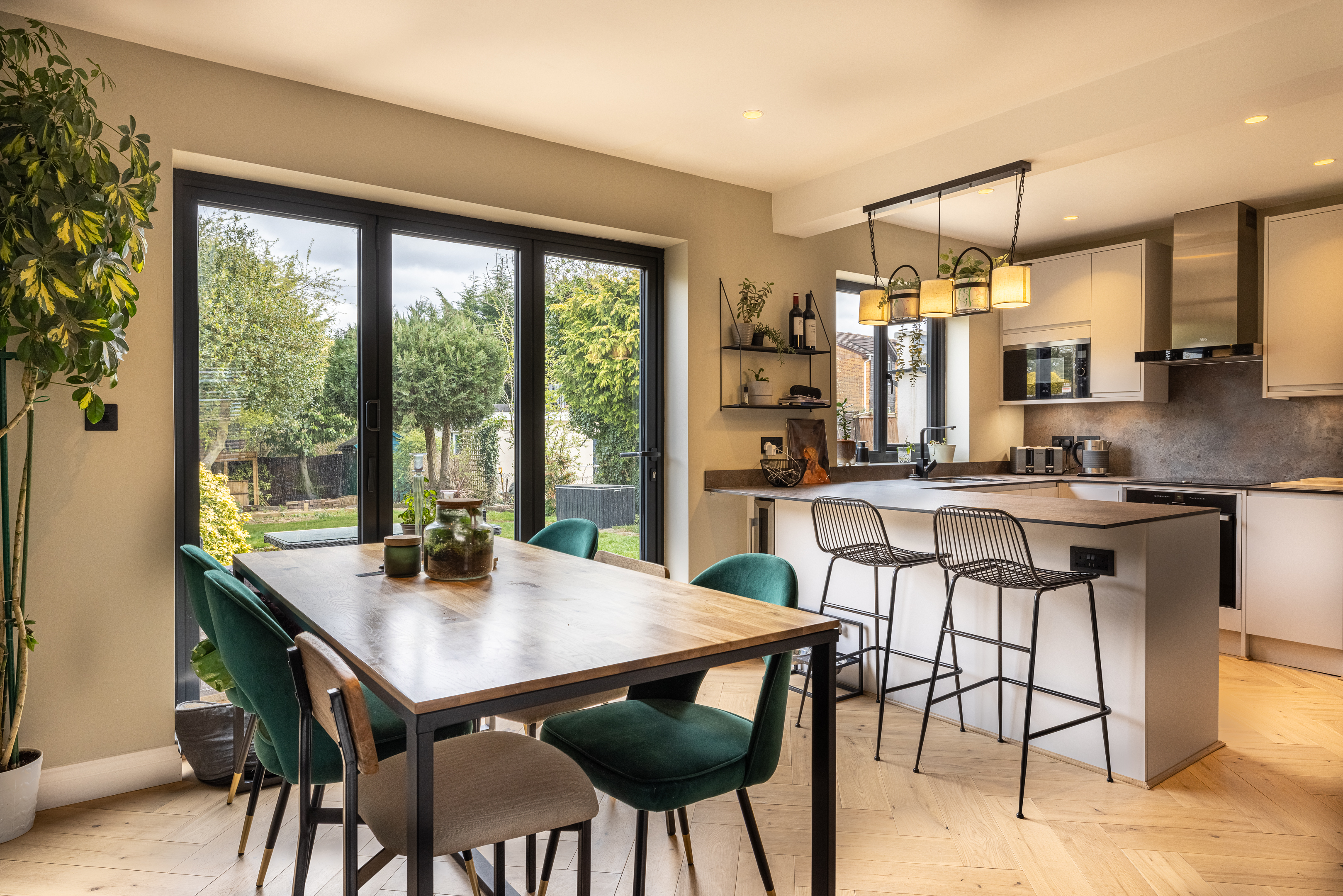Financing Your Home Extension
- 20-10-23
- min read
- Blog
Embarking on a home extension project is an exciting venture, but it's no secret that such endeavours come with significant financial commitments.
Figuring out how to finance your home extension is essential, and while the preferred method in most cases is remortgaging, there are quite a few approaches.
Whether it's remortgaging, taking out a home improvement loan, or dipping into savings, the options are varied and often complex.
In this blog, we'll explore the diverse paths to financing your home extension, offering insights and guidance to help you navigate this critical aspect of your project confidently and clearly.
Remortgaging involves refinancing your existing mortgage by taking out a new one, either with your current lender or another. This is a tried-and-tested method for financing a home extension, allowing you to tap into your home's equity to fund the extension project.
In essence, remortgaging means borrowing against your property's value. If the property has appreciated since the original mortgage was taken out, you're merely extracting that increased value as cash to cover the extension, which is ideal.
Here's how the process typically works:
Initial Contact: Contact your current lender or another lender to discuss remortgaging options and agree on an appraiser.
Property Appraisal: A professional evaluates your property to determine its market value. Various factors like the home’s conditions and local and national housing market are considered.
Calculating Available Equity: Subtracting the remaining mortgage balance from the appraised value determines the equity available for borrowing.
Mortgage Products: Various remortgage products are available, ranging from fixed-rate to variable-rate mortgages.
Agreement Terms: You'll negotiate and agree on terms like interest rate, loan duration, and other costs with the new lender.
Approval Process: Lenders assess your creditworthiness, including credit check, income verification, and examination of your debt-to-income ratio.
Paying off the Old Mortgage: The new mortgage funds are used to clear the existing debt.
Associated Fees: Depending on the existing agreement, early repayment charges or exit fees may exist.
Disbursement: After paying off the old mortgage, the remaining funds are made available for the extension.
Managing the Funds: Proper budgeting and oversight are vital to ensure the project stays on track.
Remortgaging can be an appealing option when contemplating a home extension, especially if you lack the immediate funds to cover the costs.
The potential to increase your living space and enhance your property's value may make remortgaging seem like the ideal choice. This might be a very shrewd economic decision when combined with the added value created by the extension. Of course, it depends on the property, its value, market conditions, and the proposed project.
Overall, remortgaging is a complex decision that demands careful consideration and analysis.
Here's a closer look at what you should think about when deciding whether to remortgage for a home extension:
Before moving forward with remortgaging, it's crucial to ask yourself the following questions:
Will the extension yield a return on investment (ROI)?
Evaluate whether the extension will indeed add value to your property. Consider factors like current market trends, the demand for specific features in your area, and how well the extension aligns with potential buyers' preferences.
For instance, houses in some city areas often come with a side return, which is a disused pathway at the side of the house. Extending into the side return can vastly expand a terraced home, making them more suitable for families.
Research generally indicates that extensions boost home value by 10 to 25% in the short term.
Some extension projects, like loft conversions, offer ROIs of 70%, which means the cost of extending is rapidly ‘paid back’ through an uplift in home value. Again, these figures are highly variable.
Will you retain enough equity?
Determine the amount of equity you'll have left in your property after remortgaging.
It's essential to maintain a comfortable equity level to protect yourself against potential market downturns and provide a financial cushion.
Can you afford the increased loan?
Assess whether you can comfortably manage the higher mortgage payments that may come with remortgaging.
This involves looking at your overall financial situation, including income, expenses, and long-term financial goals.
Navigating the remortgaging process can be complex – seeking financial advice from a mortgage broker is crucial.
Here's how experts can help:
An experienced mortgage broker can guide you through the available options, help you understand the potential costs and benefits, and assist in finding the best remortgaging deal for your circumstances.
A professional appraiser can accurately assess your property's current value, giving you a clear understanding of how much equity is available for remortgaging.
Consulting with a legal professional ensures you understand all legal obligations and potential implications of remortgaging.
Remortgaging for a home extension can be highly beneficial in terms of adding value to your property and providing a dependable way to finance the extension.
Some key advantages include:
Ultimately, remortgaging represents a strategic option for financing home extensions, leveraging the existing value tied up in your property. While it offers substantial advantages, it also entails specific requirements and potential risks.
Therefore, working with financial and real estate professionals to understand the process, evaluate your property, and find the best mortgage terms is often advisable. It ensures that you make informed decisions that align with your financial situation, home improvement goals, and long-term investment strategy.
Remortgaging, while a prevalent option for funding home extensions, isn’t the only available pathway for homeowners looking to enhance their living space.
Extending a home may be part of a broader plan to add value to the property, accommodate a growing family, or create more comfortable living areas.
However, the financial implications of remortgaging can be substantial, and it may not be suitable for everyone. Below are some of the viable alternatives:
These are unsecured loans provided by banks or other financial institutions. They typically come with fixed interest rates, meaning the monthly repayments remain constant over the loan term.
Personal loans are often best suited for smaller extension projects without excessive required funds.
Since these unsecured loans usually have higher interest rates than other loan options, approval can be quicker and doesn't require collateral.
These are specialised loans specifically designed for home renovations and extensions. They can be available as either secured or unsecured, with the secured option typically offering lower interest rates as the home itself may act as collateral.
Various lenders offer these loans, each with different terms, interest rates, and requirements. Home improvement loans can cover larger projects and offer extended repayment periods.
Utilising personal savings or investments is another option for funding a home extension. This method can be highly cost-effective since it doesn’t involve paying interest on borrowed funds.
However, it may significantly deplete your financial safety net, potentially leaving you vulnerable in unexpected financial situations.
Careful consideration of the long-term implications is crucial before choosing this path.
Credit cards may be a viable option for smaller projects or as a supplementary funding source.
Some credit cards offer low or zero-interest introductory periods, making them attractive for short-term financing needs.
However, the high-interest rates that often follow the introductory period can make this option costly if the balance isn't repaid in time.
Careful management and understanding of the credit terms are necessary to avoid potential financial pitfalls.
In some situations, family members or friends may be willing to offer financial support for the extension project, either as a gift or a loan.
Although this option can be flexible and interest-free, it's essential to establish clear terms to prevent potential misunderstandings or strained relationships.
Combining different funding sources, such as a partial remortgage with savings or a personal loan, can create a tailored financing solution.
This hybrid approach can provide the necessary funds while mitigating some of the drawbacks of each individual method.
Embarking on a home extension project promises new possibilities, expanded spaces, and the opportunity to tailor your home to your unique needs and desires.
The financial aspect, while daunting, is an essential part of the journey, one that can be navigated with confidence through careful planning and professional advice.
With comprehensive understanding, guided support, and a clear strategy, you can finance your home extension in a way that complements both your financial status and your vision for your home.
Contact Design Team to learn more today.
Book a free Design Consultation with one of our team to discuss your project in more detail.

19-02-24 5

19-02-24 5
.jpg)
17-01-24 5